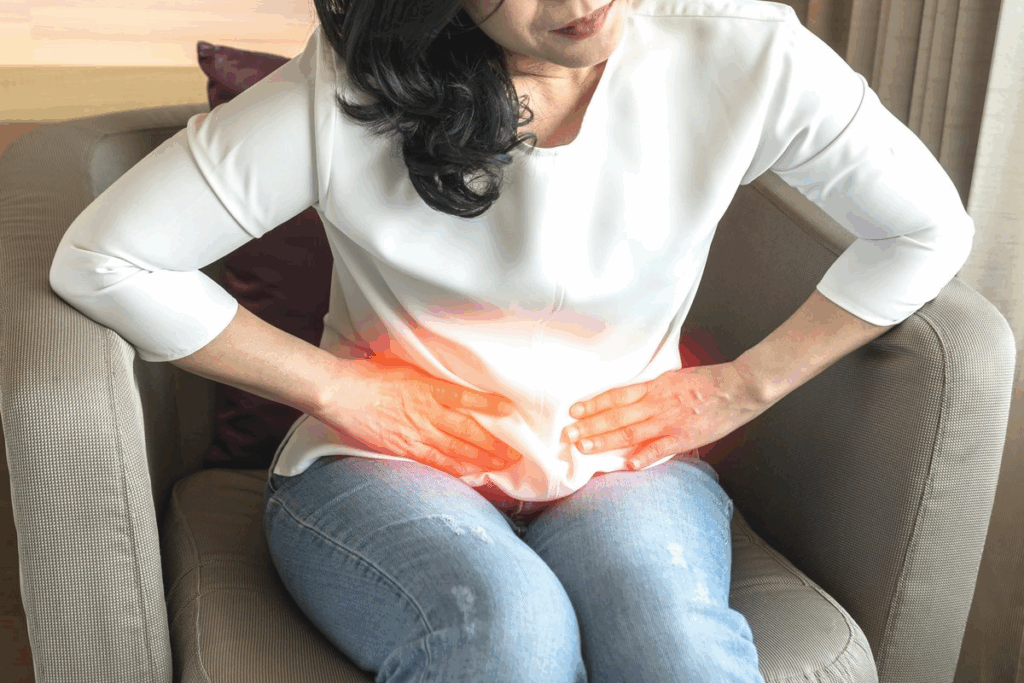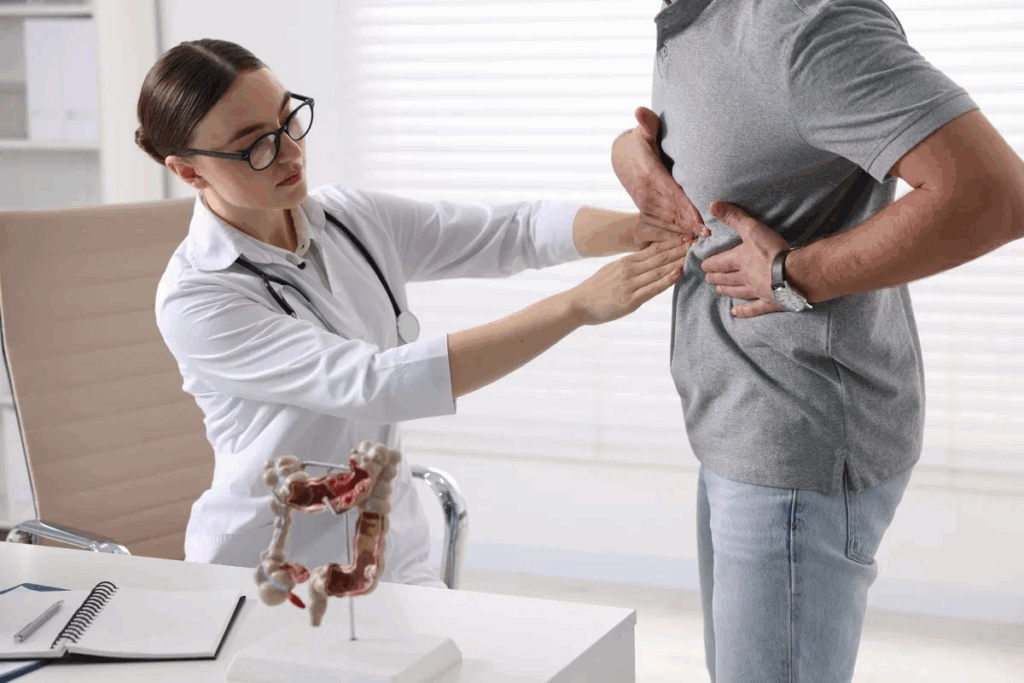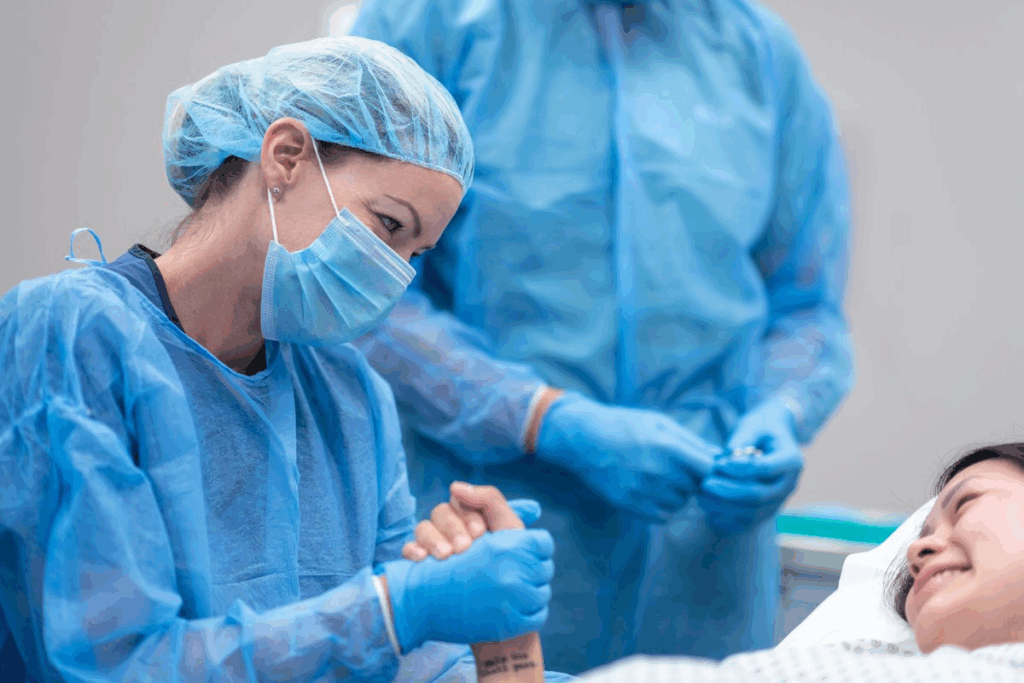Last Updated on October 30, 2025 by Bilal Hasdemir

After having gallbladder removal surgery, many patients ask when they can drink alcohol again. Doctors usually say to wait at least two weeks before drinking. This time is important for healing well. Asking ” can I drink alcohol after gallbladder surgery “? Get the best advice on when it’s safe and what risks to consider.
It’s good to drink less or not at all before and after surgery. Knowing how alcohol affects you without a gallbladder is key for good digestion in the long run.

It’s important to know how the gallbladder works and what happens when it’s removed. The gallbladder is a small, pear-shaped organ under the liver. It plays a big role in our digestion.
The gallbladder stores bile from the liver. Bile helps break down fats for digestion. When food reaches the small intestine, the gallbladder releases bile. This bile helps fats break down into smaller pieces.
Without a gallbladder, digesting fats is harder. But the body can do it. The liver keeps making bile, which goes straight to the small intestine. This way, fats can be digested, even without a gallbladder.
Cholecystectomy, or gallbladder removal, is usually done laparoscopically. This means small cuts in the belly for instruments and a camera. The surgeon then takes out the gallbladder through one of these cuts.
Gallstones are the main reason for removing the gallbladder. These hard deposits can cause pain and infection. Other reasons include:
Knowing these reasons helps patients get ready for surgery and the lifestyle changes that come with it. This includes changes in alcohol use.

After gallbladder surgery, the recovery time is important. You need to make dietary changes and watch for complications. This helps your body heal and adjust without the gallbladder.
The healing time after gallbladder surgery is about a few weeks. You can start doing normal things in 1 to 2 weeks. But, it might take longer to fully recover.
Your diet is very important during recovery. You’ll start with a liquid diet, then move to soft foods, and eventually back to normal food.
| Stage | Dietary Recommendations |
| Immediate Post-Surgery | Liquid diet (broth, clear soups) |
| Early Recovery | Soft foods (mashed potatoes, yogurt) |
| Late Recovery | Start eating normal foods again, but avoid fatty or spicy foods |
Complications are rare but can happen. Knowing the signs of a problem is important.
It’s key to watch how your body reacts to surgery. Tell your doctor if you notice anything off. This helps you recover smoothly.
Not having a gallbladder changes how your body deals with alcohol and fat digestion. After surgery, the liver’s bile goes straight to the small intestine. This can change how fats are digested and how the body reacts to alcohol.
Without a gallbladder, the body has to find new ways to digest fats. Normally, the gallbladder stores bile from the liver and releases it into the small intestine. After surgery, bile goes directly from the liver to the small intestine. This can lead to changes in fat digestion and affect alcohol processing.
The liver is key in breaking down alcohol. After gallbladder removal, the liver keeps working, but it faces extra stress. Drinking alcohol after surgery can impact liver function as it deals with alcohol and bile flow.
Drinking after gallbladder removal can cause digestive issues. Some people might get diarrhea, bloating, or abdominal pain. It’s important to watch for these symptoms and know how your body reacts to alcohol.
Knowing these changes helps people make better choices about drinking after gallbladder surgery. Always talk to a healthcare provider for advice that fits your needs.
Knowing when to start drinking alcohol again after gallbladder surgery is key for a good recovery. The liver and digestive system change a lot after the gallbladder is removed. This affects how alcohol is broken down.
Doctors usually tell patients to wait at least two weeks before drinking alcohol after gallbladder surgery. This initial recovery period is important for healing and adjusting to life without the gallbladder.
During this time, the body is more likely to face problems. Drinking alcohol too soon can stress the liver and digestive system more.
The two-week wait is advised because it gives the body time to heal and adjust. Alcohol consumption during this time can slow down healing and cause problems.
Before starting to drink alcohol again, look for signs your body is ready. These include:
When you’ve reached these points, you can start slowly introducing alcohol into your diet. Begin with small amounts to see how your body reacts.
After gallbladder surgery, it’s important to be careful with alcohol. Drinking too soon can cause serious health problems.
Drinking alcohol too early can cause digestive issues and impaired liver function. The liver is key in processing alcohol. Without a gallbladder, digestion is already tough.
Alcohol can slow down healing by affecting nutrient absorption and impairing immune function. After surgery, the body needs the right nutrients to heal well.
Patients often take medications after surgery, like pain relievers and antibiotics. Alcohol can mix badly with these, causing problems.
| Medication Type | Potential Interaction with Alcohol |
| Pain Relievers | Increased risk of liver damage |
| Antibiotics | Reduced efficacy or increased side effects |
Patients should listen to their doctors about alcohol after gallbladder surgery. This helps avoid risks and ensures a good recovery.
It’s important to know when it’s safe to drink alcohol again after having your gallbladder removed. The time frame for starting to drink alcohol again varies. It depends on how well you recover and the medical advice you get.
Doctors usually tell patients to wait at least two weeks before drinking alcohol again. This initial waiting period helps your body heal and adjust to not having a gallbladder.
While waiting, it’s key to stick to a strict dietary regimen and avoid alcohol. This reduces the chance of complications. Your doctor might give you specific advice based on your health and how you’re recovering.
Several things can affect when you can safely drink alcohol after gallbladder removal. These include:
It’s important to think about these factors and talk to your doctor. They can help figure out the best time for you to start drinking again.
When you’re ready to start drinking again, start with a small amount. Watch how your body reacts.
If you feel bad, like diarrhea, stomach pain, or nausea, slow down or stop. Or, talk to your doctor for more advice.
After your gallbladder is removed, it’s important to understand how your body handles alcohol. Your body changes how it digests fats and processes alcohol after surgery.
The liver keeps making bile, but it goes straight to the small intestine now. This change can impact how you process alcohol and fats. Your body might adjust, but it’s different for everyone.
Some people might find they can’t handle alcohol as well, while others won’t notice a big difference. It’s key to listen to how your body reacts to alcohol and adjust your drinking habits.
How well you can handle alcohol after gallbladder removal varies a lot. Your health, diet, and genes can all play a part in your tolerance.
| Factors Affecting Alcohol Tolerance | Description | Impact on Tolerance |
| Overall Health | Pre-existing health conditions can influence alcohol tolerance. | Lower tolerance |
| Diet | A diet high in fats may exacerbate digestive issues when consuming alcohol. | Variable |
| Genetic Predispositions | Genetic factors can affect how the body processes alcohol. | Variable |
It’s important to watch how your body reacts to alcohol after gallbladder removal. Look out for signs like diarrhea, bloating, or stomach pain. If you have any bad reactions, think about drinking less or not at all.
By paying attention to your body and making smart choices, you can enjoy alcohol in a way that’s good for you. This helps keep your health and well-being in check.
Choosing the right alcohol after gallbladder surgery is key for your digestive health. The removal of the gallbladder changes how the body digests fats. This can affect how alcohol is processed.
Opt for lower-fat drinks when picking an alcoholic beverage. Here are some good options:
Table: Comparison of Alcoholic Beverages
| Beverage | Fat Content | Calorie Count |
| Red Wine (5 oz) | 0g | 125 |
| Vodka (1.5 oz) | 0g | 97 |
| Light Beer (12 oz) | 0g | 110 |
Some drinks might upset your stomach more after gallbladder removal. These include:
It’s important to control your portions and drink in moderation after gallbladder removal. Here are some tips:
By choosing the right alcohol and drinking in moderation, you can enjoy drinks without too much discomfort.
Adding alcohol to your diet after gallbladder surgery needs careful planning. Timing, food pairing, and staying hydrated are key. These steps help avoid discomfort and ease the transition.
When to drink alcohol is very important after gallbladder surgery. Wait at least two weeks before starting. This lets your body heal. Start with small amounts and watch how your body reacts.
Best times to drink alcohol:
Choosing the right foods with alcohol can lessen stomach upset. Pick low-fat foods and avoid greasy or high-fat meals.
| Food Type | Recommended Foods | Foods to Avoid |
| Proteins | Lean meats, fish | Fatty meats, fried foods |
| Vegetables | Steamed vegetables, salads | Fried vegetables, creamy sauces |
| Dairy | Low-fat dairy products | High-fat dairy products |
Drinking enough water is vital when you have alcohol after gallbladder surgery. Water helps dilute the alcohol and eases digestion.
Hydration tips:
Some health issues and warning signs mean you should not drink alcohol after your gallbladder is removed. Knowing these signs is key to staying healthy and avoiding problems.
People with certain health problems should not drink alcohol after their gallbladder is taken out. These include liver disease, pancreatitis, and gastrointestinal disorders. These conditions can make digestion harder and raise the risk of bad reactions to alcohol.
Liver disease makes it harder for the liver to handle alcohol, leading to more toxicity. Pancreatitis can get worse with alcohol, causing severe inflammation and pain.
Watch how your body reacts to alcohol after gallbladder surgery. Signs to stop drinking include severe abdominal pain, persistent diarrhea, and vomiting. If you see these symptoms, talk to your doctor right away.
If you’re thinking about drinking alcohol again after gallbladder surgery, talk to your doctor first. They can give advice based on your health history and current condition.
Your doctor can help you understand the risks and benefits of drinking alcohol. They might suggest other drinks or ways to avoid discomfort.
Life after gallbladder removal needs careful thought about many lifestyle aspects, like drinking alcohol. The recovery and how your body adjusts to not having a gallbladder are key. They help decide how to safely add alcohol back into your diet.
Finding a balance in your life after gallbladder removal is key for staying healthy. It means paying attention to what you eat, how much alcohol you drink, and other daily habits. Knowing how your body reacts to different foods and drinks helps you make choices that are good for you.
When it comes to drinking alcohol, it’s important to drink in moderation. Slowly adding alcohol back into your diet, as a doctor suggests, helps you figure out how much you can handle. It’s important to watch how your body reacts and adjust your drinking to fit your new lifestyle.
Living a healthy life after gallbladder removal takes time, awareness, and making smart choices. By finding the right balance, you can live a full and healthy life.
It’s wise to wait at least two weeks after gallbladder surgery before drinking. But, always follow your doctor’s advice. Your personal situation can also affect how soon you can drink.
Without a gallbladder, fat processing can be tough. This might cause digestive problems. Drinking alcohol can also harm your liver and make these issues worse.
Drinking too early can cause problems. It might slow down healing and mix badly with your meds.
Opt for low-fat drinks like wine or spirits with low-fat mixers. Always drink in moderation.
Yes, if you have liver disease, you should avoid alcohol. Always talk to your doctor about your health.
Choose the right time to drink, eat the right foods, and drink plenty of water. This can help you feel better.
Always check with your doctor about alcohol and your meds. They can tell you if it’s safe.
You’re ready if you’ve fully recovered, have few digestive problems, and your liver is back to normal.
Start slow with small amounts of alcohol. Watch how your body reacts before drinking more.
If you have ongoing digestive problems, talk to your doctor first. Alcohol might make things worse.
Subscribe to our e-newsletter to stay informed about the latest innovations in the world of health and exclusive offers!
WhatsApp us